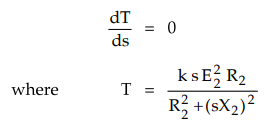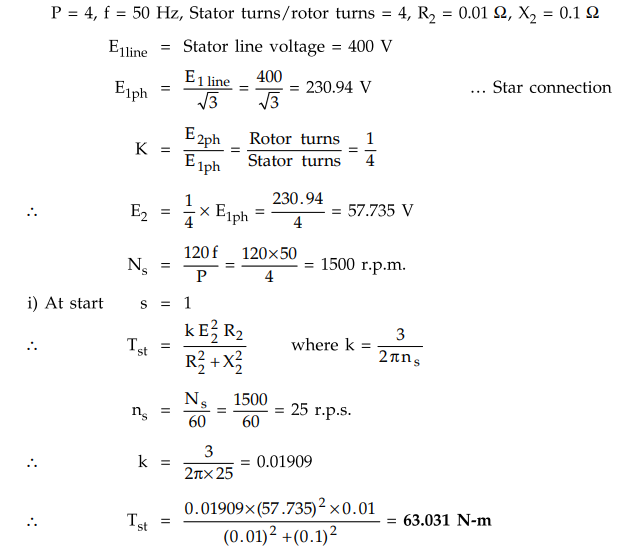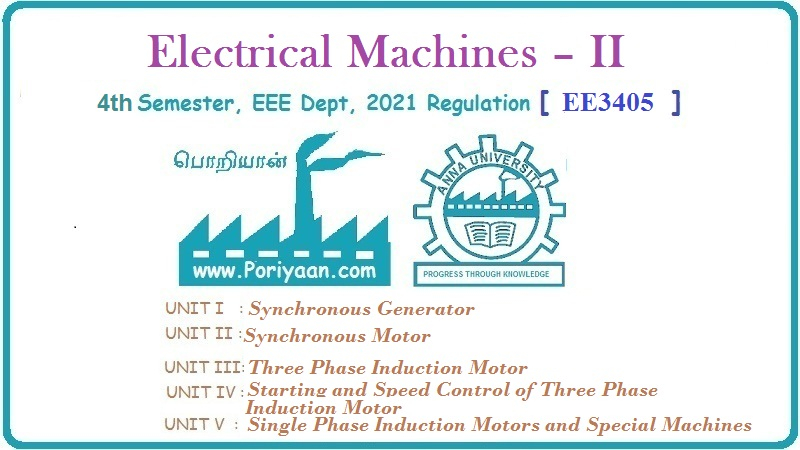Electrical Machines II: UNIT III: a. Three Phase Induction Motor
Condition for Maximum Torque
Three Phase Induction Motor
Hence while finding the condition for maximum torque, remember that the only parameter which controls the torque is slip s.
Condition for Maximum Torque
From
the torque equation, it is clear that torque depends on slip at which motor is
running. The supply voltage to the motor is usually rated and constant and
there exists a fixed ratio between E1 and E2. Hence E2
is also constant. Similarly R2, X2 and ns are
constants for the induction motor.
Hence
while finding the condition for maximum torque, remember that the only
parameter which controls the torque is slip s.
Mathematically
for the maximum torque we can write,

While
carrying out differentiation remember that E2, R2, X2
and k are constants. The only variable is slip s. As load on motor changes, its
speed changes and hence slip changes. This slip decides the torque produced corresponding
to the load demand.

As
both numerator and denominator contains s terms, differentiate T with respect
to s using the rule of differentiation for u/v.

This
is the slip at which the torque is maximum and is denoted as sm.
Sm
= R2 / X2
It
is the ratio of standstill per phase values of resistance and reactance of
rotor, when the torque produced by the induction motor is at its maximum.
1. Magnitude of Maximum Torque
This
can be obtained by substituting Sm = R2 / X2
in the torque equation. It is denoted by

From
the expression of Tm, it can be observed that
1.
It is inversely proportional to the rotor reactance.
2.
It is directly proportional to the square of the rotor induced e.m.f. at
standstill.
3.
The most interesting observation is, the maximum torque is not dependent on
the rotor resistance R2. But the slip at which it occurs i.e.
speed at which it occurs depends on the value of rotor resistance R2.
Example
5.10.1 A 400 V, 4 pole, 3 phase, 50 Hz star connected
induction motor has a rotor resistance and reactance per phase equal to 0.01 Ω
and 0.1 Ω respectively. Determine i) starting torque ii) slip at which maximum
torque will occur iii) speed at which maximum torque will occur iv) maximum
torque v) full load torque if full load slip is 4 %. Assume ratio of stator to
rotor turns as 4.
Solution
:
The given values are,

ii)
Slip at which maximum torque occurs is,

iii)
Speed at which maximum torque occurs is speed corresponding to sm,
N
= Ns (1 - sm) = 1500
(1 - 0.1) - 1350 r.p.m.
iv)
The maximum torque is,

Example
5.10.2 A three phase, 50 Hz, 400 V induction motor has
4 poles star connected stator winding. Rotor resistance and reactance per phase
are 0.15 Ω and 1 Ω respectively. Full load slip is 5 %. Calculate : a) Total
torque developed b) Maximum torque c) Speed at maximum torque. Assume stator to
rotor ratio 2:1.
Solution
:
The given values are,

Examples
for Practice
Example
5.10.3 A 3-phase induction motor has a 4r-pole, star
connected stator winding. The motor runs on a 50 Hz supply with 200 V between
lines. The rotor resistance and standstill rotor reactance per phase are 0.1 Q
and 0.9 Q respectively. The ratio of rotor to stator turns in 0.67. Calculate :
i)
Total torque at 4 % slip
ii)
Maximum torque developed
iii)
Speed at maximum torque
iv)
Maximum mechanical power
Neglect
stator impedance.
[Ans.:
i) 40.4786 Nm, ii) 63.5065 Nm, iii) 1333.333 r.p.m., iv) 8867.1801 W]
Example
5.10.4 Calculate the torque exerted by an 8 pole 50 Hz,
3 phase induction motor operating with a 4 % slip which develops a maximum
torque of 150 kgm at a speed of 660 r.p.m. The resistance per phase of the
rotor is 0.5 Ω. VTU : July-06
[Ans.:
882.9 Nm]
Example
5.10.5 A 440 V, 3ϕ, 50 Hz, 4 pole, star connected
induction motor has a full load sped of 1425 rpm. The rotor has an impedance of
(0.4 + j4) Ω per phase and rotor / stator turn ratio of 0.8. Calcualte : i)
Full load torque; ii) Full load copper loss; iii) maximum torque and the speed
at which it ocurs; iv) Starting current.
[Ans.:
78.88 Nm, 619.518 W, 98.6 Nm, 1350 r.p.m., 50.554 A]
Example
5.10.6 A 3-phase inductin motor having 6-poles, stator
winding is star connected runs on 240 V, 50 Hz supply. The rotor resistance and
stand still reactance are 0.12 Q and 0.85 Q per phase. The ratio of stator to
rotor turns is 1.8 and full load slip is 4%. Calcualte the developed torque at
full load, maximum torque and the speed at maximum torque.
[Ans.:
52.372 Nm, 99.85 Nm, 858.9 r.p.m.]
Review Question
1. Derive the condition for the maximum torque in a three phase
induction motors. Also obtain the expression for the maximum torque.
Electrical Machines II: UNIT III: a. Three Phase Induction Motor : Tag: Engineering Electrical Machines - II : Three Phase Induction Motor - Condition for Maximum Torque
Related Topics
Related Subjects
Electrical Machines II
EE3405 Machine 2 EM 2 4th Semester EEE Dept | 2021 Regulation | 4th Semester EEE Dept 2021 Regulation
